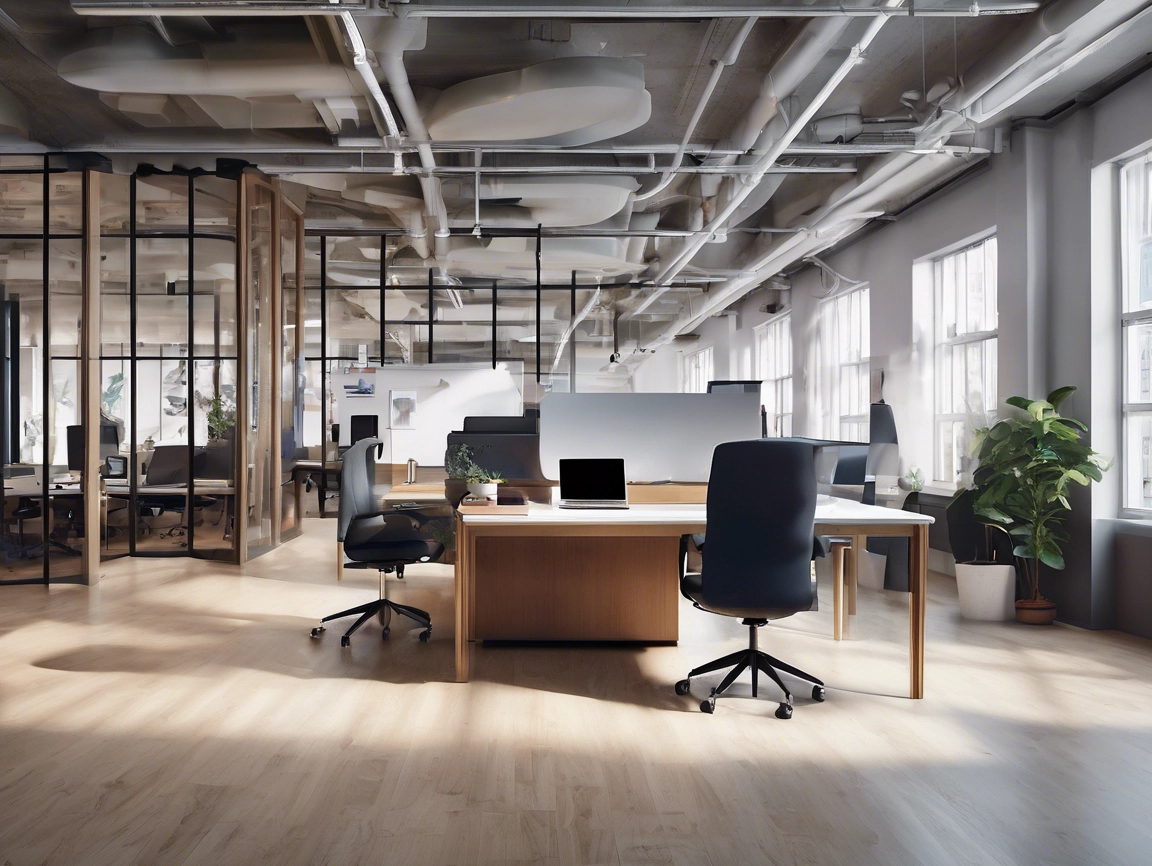
Introduction: Moving your business out of the spare bedroom or garage and into a rented office is more than a logistical upgrade – it’s a psychological turning point. For many new entrepreneurs in the UK, this step is fraught with both excitement and anxiety. You’re trading the comfort (and low cost) of a home setup for the commitment of a professional space. It can feel like a bold declaration: “This is a real business now.” In this article, we’ll explore the mindset required to make this leap, from overcoming fear of failure to adopting a growth mindset. We’ll look at psychological insights (like why taking risks is essential and how to reframe fear) and real-world examples of entrepreneurs who grew their companies by stepping into that first office. By understanding the psychology behind the decision, you can approach it with confidence and a clear plan.
Stepping Out of the Comfort Zone: Risk vs. Reward
Leaving the comfort of a home office means embracing uncertainty. It’s normal to worry about signing a lease or paying rent before you’re 100% sure it will pay off. In fact, fear of failure stalks the world of the entrepreneur, as one study put it hbr.org.
Many founders secretly wonder, “What if I take this step and my business doesn’t grow enough to sustain it?” These fears are not unfounded – roughly 75% of ventures fail within 10 yearshbr.org – yet the difference between those who stall and those who succeed often comes down to mindset.
For entrepreneurs, courage isn’t the absence of fear but the ability to persist in spite of ithbr.org. Research by professors at Warwick Business School found that fear of failure is common even among entrepreneurs, but what matters is how you respond to that fearcobsinsights.org. In other words, you can feel afraid and still take action.
In the UK, fear of failure can be especially pronounced. Reports show that our aversion to risk is higher than in many other countries cityam.com.
According to one study, those citing fear of failure as a reason not to start a business is about 20% higher in the UK than the global average cityam.com. Culturally, we tend to be a bit more cautious. This “comfort zone” mentality can even lead entrepreneurs to hold themselves back from growth – in one survey, over a fifth of UK business owners said they were not interested in growing their businesses further cityam.com. Often, this isn’t due to lack of opportunity, but due to fear of overreaching and failing. Staying small feels safer. If you’ve been hesitating to rent an office because it feels risky, you’re not alone. But it’s worth examining whether that fear is actually protecting you, or just keeping your business stuck.
Overcoming the Fear of Failure with a Growth Mindset
A crucial mindset shift in taking the leap is moving from fear-focused thinking to a growth-focused thinking. Psychologists call this a growth mindset – a belief that abilities and businesses can be developed with effort, learning, and persistence online.hbs.edu. With a growth mindset, challenges (like higher rent or a longer commute) are not catastrophes, but opportunities to learn and improve online.hbs.eduonline.hbs.edu. Instead of thinking “If I can’t handle this immediately, it means I shouldn’t do it,” an entrepreneur with a growth mindset thinks, “I might not be fully ready, but I can grow into it.” This perspective is invaluable when considering an office move. It allows you to view the first office not as a burdensome cost, but as an investment in expanding your capabilities.
Importantly, a growth mindset also reframes failure. Rather than seeing failure as a permanent indictment of your ability, you see it as a temporary setback and a lesson. Adopting this view can reduce the paralysis that fear brings.
You begin to realise that the biggest risk might actually be never taking a risk at all – as Facebook’s early investor Peter Thiel told Mark Zuckerberg, “In a world that’s changing so quickly, the biggest risk you can take is not taking any risk.”online.wharton.upenn.edu. In entrepreneurship, not making a move can mean missing the chance to grow.
On the other hand, taking a calculated risk – like upgrading to an office when you have indicators of growth – can propel your business forward. In fact, research consistently finds that entrepreneurs are more comfortable with uncertainty and calculated risk than the average persononline.wharton.upenn.edu. Risk tolerance (or conversely, low risk-aversion) is a key trait that predicts who will step out to start and grow a business online.wharton.upenn.edu. This doesn’t mean being reckless; it means being willing to act under uncertainty. If you’re debating an office move, try to channel that entrepreneurial spirit: weigh the pros and cons, but don’t let worst-case scenarios completely dominate your decision-making.
Tip: One way to manage fear is to do it with a plan. Make sure you run the numbers for affordability, perhaps negotiate a short-term lease or a coworking arrangement first, and have a contingency fund. Having a plan can give you psychological safety nets, so your risk is calculated, not crazy. This addresses fear with practical action, allowing you to move forward more confidently.
Psychological Benefits of a Dedicated Office Space
Beyond the financial and practical aspects, moving into a professional space can have profound psychological benefits for a business owner and their team.
Environment shapes mindset – the space in which you work can influence your productivity, motivation, and even your identity as a business owner. Working from home has its perks, but it also carries some hidden drawbacks. Psychology research has noted that working from home can pose risks to mental health and productivity, unless one is intrinsically motivated psychologytoday.com. It’s easy to fall prey to household distractions, blurred work-life boundaries, or even a sense of isolation when you never leave the house. By contrast, an office environment establishes a clear “workspace” which can help you switch into a professional mode each day. Simply having a place to go to work can boost focus and routine.
Another major benefit of stepping into an office is the reduction of isolation. Humans are social creatures, and entrepreneurs working solo often report loneliness when they’re home-bound. The workplace provides community, something a home office inherently lacks psychologytoday.com. Even if you’re not hiring employees yet, renting a desk in a coworking space or a small office in a shared building puts you in proximity with other professionals. Those hallway chats or even just being around the energy of others can inspire creativity and motivation.
A Harvard Business Review study found that connections with others are a big reason why people pay to work in a communal space instead of working from home for free hbr.org. In other words, the psychological uplift of being around others, sharing ideas, and having a sense of belonging can be well worth the rent. This sense of community can foster a growth-oriented atmosphere – you’re reminded that you’re part of the wider world of business, not just an isolated individual with a laptop.
Lastly, having an office can boost your professional identity and confidence. It’s not about vanity; it’s about signaling (to yourself as much as others) that your venture is real and here to stay. You might find that meeting clients at a proper office or even seeing your company name on the office directory reinforces your sense of purpose. It can also increase others’ perceptions of your legitimacy, which can be a self-fulfilling boost – you feel more confident pitching, networking, and growing because you’ve “leveled up” the business in a visible way. In short, the psychological payoff of an office often comes in the form of greater focus, healthier work-life separation, more motivation, and a stronger entrepreneurial identity.
Examples: Entrepreneurs Who Took the Leap
For instance, Google’s early team is shown here outside their first real office in Palo Alto, California. The company famously began in a garage, but within months they needed to upgrade to this modest rented space once they had around eight employees technology.inquirer.net.
Securing an actual office was a turning point, signaling that Google was now a “real” company and not just a Stanford project. In fact, they outgrew this initial office within a few months, prompting another move to a larger premises in Mountain View technology.inquirer.net. This rapid progression illustrates a key idea: taking the step into an office often accelerates growth by providing the needed room (physically and mentally) to expand.
Plenty of UK entrepreneurs have similar stories of humble beginnings transformed by that first office. Cambridge Satchel Company founder Julie Deane famously started her business at her kitchen table with just £600, initially as a way to pay her children’s school fees. She grew that kitchen-table startup into a company with £12 million in annual sales telegraph.co.uk, eventually moving out of the house into proper facilities as the demand exploded.
Another example is Gymshark, the fitness apparel brand. Founder Ben Francis began sewing and screen-printing workout gear in his parents’ garage in Birmingham while he was a teenager. He packed orders from that garage by hand and even delivered products locally himself.
As Gymshark’s online sales took off, the team moved from that small home setup into ever-larger office spaces – by 2016, the company had outgrown its tiny office and moved into a large headquarters in Solihull, complete with a staff of hundreds.
Today Gymshark is a billion-pound company, but it all started with one young entrepreneur deciding to take his project out of the garage and treat it like a real business. These stories show that the leap to a dedicated workspace is often a catalyst moment. The entrepreneurs didn’t wait until everything was perfect – they grew into their offices. And those offices, in turn, gave them the capacity to reach new heights.
Even smaller-scale examples echo this pattern. One entrepreneur recalled how getting a tiny 200 sq. ft. first office (crammed with three people and a dog) felt like a huge milestone: “gosh darn-it, it was an office!”linkedin.com. It made the business feel tangible and set the stage for landing bigger clients and eventually hitting seven-figure revenues. The common thread is that the physical move often triggers a psychological shift – a greater commitment to growth and a newfound confidence. It’s like crossing a threshold from “I run a business from home” to “I am building an enterprise.”
Overcoming Uncertainty: Is It the Right Time?
Given the benefits, how do you know if it’s the right time to take this step? There’s no magic formula, but both practical indicators and mindset checks can guide you. Start by assessing your business needs and pain points. Are you struggling to focus at home due to distractions or family responsibilities? Do you need space for inventory, equipment, or a growing team that simply doesn’t fit in your current setup? Perhaps clients have started asking to meet at your “office” or you feel hesitant to put your home address on business materials. These can be signs that an external space would add professionalism and efficiency.
Next, take a hard look at your finances with a planning mindset. A good rule of thumb is to ensure you can cover several months’ worth of rent and expenses even if revenue has a hiccup. This financial cushion will ease your anxiety and prevent the office from becoming a strain. You could also consider intermediate steps: for example, rent a desk at a coworking space or a shared office hub before committing to a private office lease. This can be a way to test the waters. Many entrepreneurs find that once they try a coworking space – enjoying the camaraderie and increased productivity – their fears about cost or commitment start to diminish as they see the returns in their motivation and output.
Psychologically, prepare yourself by visualizing the growth you aim to achieve in the new space. Set clear goals for what having an office will enable: perhaps it’s doubling your client meetings, hiring your first employee, or launching a new product line that requires space. Having this vision turns the office from a scary expense into a tool for growth. Also, remind yourself that few great businesses scale without investing in infrastructure. Every company you admire, from local success stories to global brands, at some point had to bet on themselves by signing a lease or expanding their footprint. They faced the same “leap of faith.” As mentioned earlier, staying in your comfort zone forever can be a bigger risk – it might mean losing out on opportunities because you’re not prepared to seize them. By contrast, taking a well-prepared leap can energize you and your business.
Finally, address the fear of failure head-on. Ask yourself: what’s the worst that realistically could happen if I get an office? Perhaps you’d spend some savings on rent for a few months and then decide it’s not working – you could always course-correct. Now compare that to the worst-case scenario of not taking the step: you might turn away big opportunities, or burn out trying to do everything in a suboptimal environment, or simply never know how far you could have gone. Most founders find that the regret of not trying would sting more than a temporary setback. If you approach the move thoughtfully, even a setback can be managed. As one business expert noted, the best thing is to face your fear with knowledge and a plan – do your homework, make contingency plans, then go for it confidentlycityam.com.
Conclusion: Embracing the Next Step
Taking the first step into renting office space is as much a psychological leap as a business decision. It requires balancing risk with reward, and fear with optimism. By cultivating a growth mindset, you can see this move not as a frightening cost but as an investment in your business’s future. Yes, it’s normal to feel butterflies when signing that lease or picking up the keys – that’s a sign that you’re pushing your boundaries in a good way.
Remember that every big company or admired entrepreneur has faced this moment. They chose to bet on themselves, often before everything was certain. As a new or growing business owner in the UK, you have the opportunity to write your own success story. That story might just turn on the moment you say, “Let’s get an office.” With the right preparation, community support, and mindset, that first office can be the launchpad for your next level of growth.
The journey of a thousand miles begins with a single step, and perhaps for you and your business, that step is through the door of your first office. Embrace it with confidence and know that you’re in good company – countless entrepreneurs have taken that same step and never looked back, turning their initial anxieties into fuel for success. Good luck on your journey, and here’s to the exciting growth ahead!






